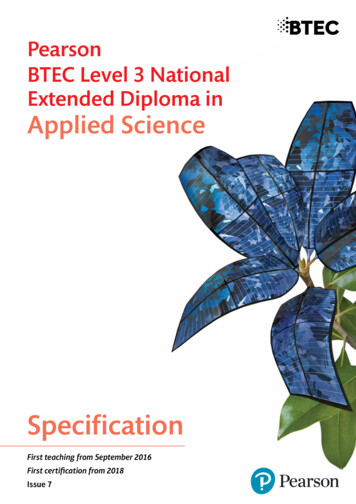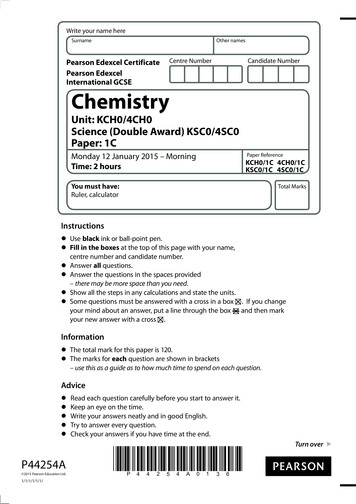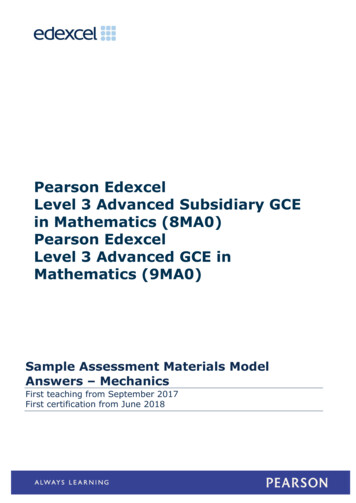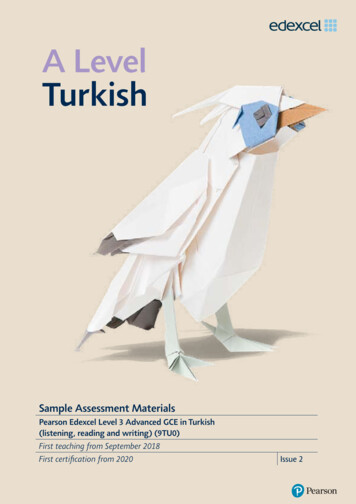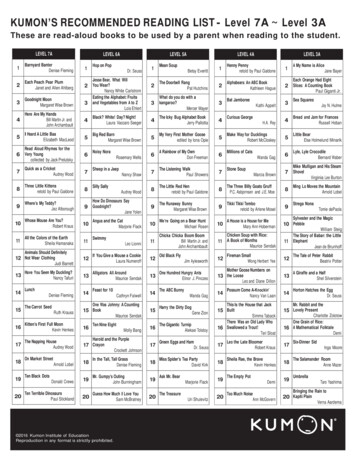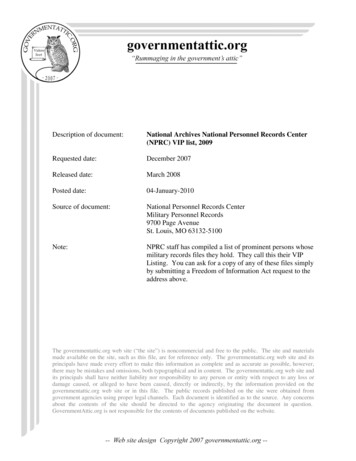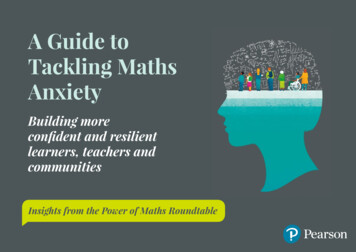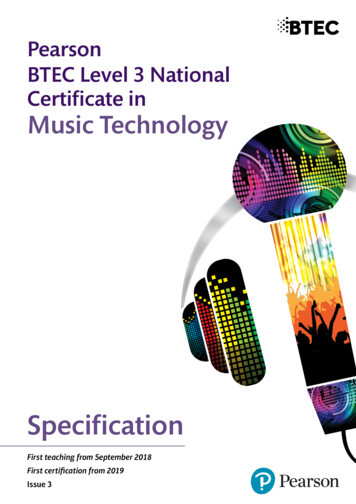
Transcription
PearsonBTEC Level 3 NationalCertificate inMusic TechnologySpecificationFirst teaching from September 2018First certification from 2019Issue 3
PearsonBTEC Level 3 NationalCertificate in MusicTechnologySpecificationFirst teaching September 2018Issue 3
Edexcel, BTEC and LCCI qualificationsEdexcel, BTEC and LCCI qualifications are awarded by Pearson, the UK’s largest awarding bodyoffering academic and vocational qualifications that are globally recognised and benchmarked.For further information, please visit our qualifications website at qualifications.pearson.com.Alternatively, you can get in touch with us using the details on our contact us page atqualifications.pearson.com/contactusAbout PearsonPearson is the world's leading learning company, with 35,000 employees in more than 70 countriesworking to help people of all ages to make measurable progress in their lives through learning.We put the learner at the centre of everything we do, because wherever learning flourishes, so dopeople. Find out more about how we can help you and your learners at qualifications.pearson.comThis specification is Issue 3. Key changes are sidelined. We will inform centres of any changes tothis issue. The latest issue can be found on our website.References to third-party material made in this specification are made in good faith. We do notendorse, approve or accept responsibility for the content of materials, which may be subject tochange, or any opinions expressed therein. (Material may include textbooks, journals, magazinesand other publications and websites.)ISBN 9781446954508All the material in this publication is copyright Pearson Education Limited 2019
WelcomeWith a track record built over 30 years of learner success, BTEC Nationals are widely recognisedby industry and higher education as the signature vocational qualification at Level 3. They provideprogression to the workplace either directly or via study at a higher level. Proof comes fromYouGov research, which shows that 62 per cent of large companies have recruited employees withBTEC qualifications. What’s more, well over 100,000 BTEC students apply to UK universities everyyear and their BTEC Nationals are accepted by over 150 UK universities and higher educationinstitutes for relevant degree programmes either on their own or in combination with A Levels.Why are BTECs so successful?BTECs embody a fundamentally learner-centred approach to the curriculum, with a flexible,unit-based structure and knowledge applied in project-based assessments. They focus on theholistic development of the practical, interpersonal and thinking skills required to be able tosucceed in employment and higher education.When creating the BTEC Nationals in this suite, we worked with many employers, higher educationproviders, colleges and schools to ensure that their needs are met. Employers are looking forrecruits with a thorough grounding in the latest industry requirements and work-ready skills suchas teamwork. Higher education needs students who have experience of research, extended writingand meeting deadlines.We have addressed these requirements with: a range of BTEC sizes, each with a clear purpose, so there is something to suit eachlearner’s choice of study programme and progression plans refreshed content that is closely aligned with employers’ and higher education needs for askilled future workforce assessments and projects chosen to help learners progress to the next stage. This meanssome are set by you to meet local needs, while others are set and marked by Pearsonso that there is a core of skills and understanding that is common to all learners.For example, a written test can be used to check that learners are confident inusing technical knowledge to carry out a certain job.We are providing a wealth of support, both resources and people, to ensure that learners and theirteachers have the best possible experience during their course. See Section 10 for details of thesupport we offer.A word to learnersToday’s BTEC Nationals are demanding, as you would expect of the most respected applied learningqualification in the UK. You will have to choose and complete a range of units, be organised, takesome assessments that we will set and mark, and keep a portfolio of your assignments. But youcan feel proud to achieve a BTEC because, whatever your plans in life – whether you decide tostudy further, go on to work or an Apprenticeship, or set up your own business – your BTECNational will be your passport to success in the next stage of your life.Good luck, and we hope you enjoy your course.
Collaborative developmentStudents completing their BTEC Nationals in music technology will be aiming to go on toemployment, often via the stepping stone of higher education. It was, therefore, essential that wedeveloped these qualifications in close collaboration with experts from professional bodies,businesses and universities, and with the providers who will be delivering the qualifications. Toensure that the content meets providers’ needs and provides high-quality preparation forprogression, we engaged experts. We are very grateful to all the university and further educationlecturers, teachers, employers, professional body representatives and other individuals who havegenerously shared their time and expertise to help us develop these new qualifications.Employers, professional bodies and higher education providers that have worked with us include: UWE University of the West of EnglandSolent UniversityMusic Education CouncilJoint Audio Media Education Support.In addition, universities, professional bodies and businesses have provided letters of supportconfirming that these qualifications meet their entry requirements. These letters can be viewed onour website.Summary of Pearson BTEC Level 3 National Certificate in MusicTechnology specification Issue 3 changesSummary of changes made between the previous issue and thiscurrent issuePagenumberThe wording in Section 7 Teacher/centre malpractice has been updated to clarifysuspension of certification in certain circumstances.Page 69The wording under Section 9 Understanding the qualification grade has beenupdated to clarify current practice in ensuring maintenance and consistency ofqualification standards.Page 72Summary of Pearson BTEC Level 3 National Certificate in MusicTechnology specification Issue 1 to Issue 2 changesSummary of changes made between Issue 1 and 2PagenumberPerformance measures clarification added:The Certificate in Music Technology (180 GLH) is not currently recognised forperformance measures.Page 1If you need further information on these changes or what they mean, contact us via our website s.html.
ContentsIntroduction to BTEC National qualifications for the music technologysector1Total Qualification Time2Qualifications, sizes and purposes at a glance3Structures of the qualifications at a glance5Qualification and unit content6Assessment6Grading for units and qualifications8UCAS Tariff points81 Qualification purpose92 Structure113 Units13Understanding your units13Index of units174 Planning your programme555 Assessment structure and external assessment57Introduction57Internal assessment57External assessment576 Internal assessment59Principles of internal assessment59Operating internal assessment59Setting assessments through assignments60Making valid assessment decisions617 Administrative arrangements64Introduction64Learner registration and entry64Access to assessment64Administrative arrangements for internal assessment65Administrative arrangements for external assessment66Dealing with malpractice in assessment68Certification and results70Additional documents to support centre administration708 Quality assurance719 Understanding the qualification grade7210 Resources and support76Support for setting up your course and preparing to teach76Support for teaching and learning77Support for assessment77Training and support from Pearson78Appendix 1 Links to industry standards79Appendix 2 Glossary of terms used for internally-assessed units80
Introduction to BTEC National qualificationsfor the music technology sectorThis specification contains the information you need to deliver the Pearson BTEC Level 3 NationalCertificate in Music Technology. The specification signposts you to additional handbooks andpolicies. It includes all the units for this qualification.This qualification is part of the suite of music technology qualifications offered by Pearson. In thesuite there are qualifications that focus on different progression routes, allowing learners to choosethe one best suited to their aspirations.All qualifications in the suite share some common units and assessments, allowing learners someflexibility in moving between sizes. The qualification titles are given below.Some BTEC National qualifications provide a broad introduction that gives learners transferableknowledge and skills. These qualifications are for post-16 learners who want to continue theireducation through applied learning. The qualifications prepare learners for a range of highereducation courses and job roles related to a particular sector. They provide progression either bymeeting entry requirements in their own right or by being accepted alongside other qualificationsat the same level and adding value to them.In the music technology sector this qualification is:Pearson BTEC Level 3 National Certificate in Music Technology (180 GLH) (603/2688/8).Some BTEC National qualifications are for post-16 learners wishing to specialise in a specificindustry, occupation or occupational group. The qualifications give learners specialist knowledgeand skills, enabling entry to an Apprenticeship or other employment, or progression to relatedhigher education courses. Learners taking these qualifications must have a significant level ofemployer involvement in their programmes.In the music technology sector these are:Pearson BTEC Level 3 National Extended Certificate in Sound Engineering (360 GLH) (603/1233/6)Pearson BTEC Level 3 National Extended Certificate in Digital Music Production (360 GLH)(603/1232/4)Pearson BTEC Level 3 National Foundation Diploma in Music Technology (540 GLH) (603/0211/2)Pearson BTEC Level 3 National Diploma in Music Technology (720 GLH) (601/7350/6)Pearson BTEC Level 3 National Extended Diploma in Music Technology (1080 GLH) (601/7351/8)The Certificate (180 GLH) is not currently recognised for performance measures. Please check ourwebsite for details of subsequent availability for future DFE performance measures.This specification signposts all the other essential documents and support that you need as acentre in order to deliver, assess and administer the qualification, including the staff developmentrequired. A summary of all essential documents is given in Section 7. Information on how we cansupport you with this qualification is given in Section 10.The information in this specification is correct at the time of publication.Pearson BTEC Level 3 National Certificate in Music Technology –Specification – Issue 3 – September 2019 Pearson Education Limited 20191
Total Qualification TimeFor all regulated qualifications, Pearson specifies a total number of hours that it is estimatedlearners will require to complete and show achievement for the qualification: this is the TotalQualification Time (TQT). Within TQT, Pearson identifies the number of Guided Learning Hours(GLH) that we estimate a centre delivering the qualification might provide. Guided learning meansactivities, such as lessons, tutorials, online instruction, supervised study and giving feedback onperformance, that directly involve teachers and assessors in teaching, supervising and invigilatinglearners. Guided learning includes the time required for learners to complete external assessmentunder examination or supervised conditions.In addition to guided learning, other required learning directed by teachers or assessors will includeprivate study, preparation for assessment and undertaking assessment when not undersupervision, such as preparatory reading, revision and independent research.BTEC Nationals have been designed around the number of hours of guided learning expected. Eachunit in the qualification has a GLH value of 60, 90 or 120. There is then a total GLH value for thequalification.Each qualification has a TQT value. This may vary within sectors and across the suite depending onthe nature of the units in each qualification and the expected time for other required learning.The following table shows all the qualifications in this sector and their GLH and TQT values.2Pearson BTEC Level 3 National Certificate in Music Technology –Specification – Issue 3 – September 2019 Pearson Education Limited 2019
Qualifications, sizes and purposes at a glanceTitleSize and structureSummary purposePearson BTEC Level 3National Certificate inMusic Technology180 GLH (250 TQT)The qualification offers an introductionto the music technology sector throughapplied learning.Equivalent in size to 0.5 ofan A Level.Two units, of which one ismandatory and one isexternal.Mandatory content (67%).External assessment(67%).The qualification supports progressionto higher education when taken as partof a programme of study that includesother vocational or generalqualifications. It is designed to supportprogression to employment followingfurther study at university.TitleSize and structureSummary purposePearson BTEC NationalExtended Certificate inSound Engineering360 GLH (520 TQT)Designed to support progression toApprenticeship or employment whentaken as part of a programme of studythat includes other appropriate BTECNationals or A Levels. A basis of studyfor the sound engineering sector with afocus on studio recording techniquesand digital audio workstation (DAW)production.Equivalent in size to oneA Level.Five units, of which twoare mandatory and one isexternal.Mandatory content 50%).Ext
In the music technology sector these are: Pearson BTEC Level 3 National Extended Certificate in Sound Engineering (360 GLH) (603/1233/6) Pearson BTEC Level 3 National Extended Certificate in Digital Music Production (360 GLH) (603/1232/4) Pearson BTEC Level 3 National Foundation Diploma in Music Technology (540 GLH) (603/0211/2)
